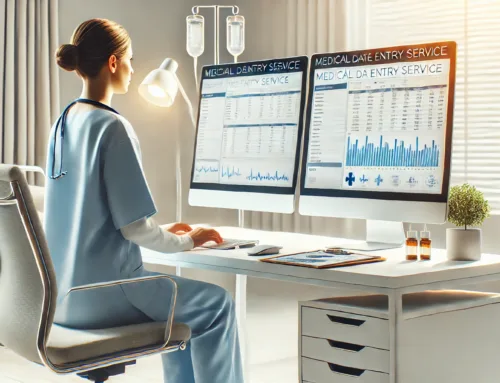To excel as a Medical Data Entry Specialist, honing specific skills is key. Your proficiency in typing speed and accuracy, coupled with knowledge of medical terminology, lays the foundation for precise data entry. However, these foundational skills for a medical data entry specialist are just the tip of the iceberg. Are you ready to discover the remaining critical abilities required to navigate the intricate world of medical data entry successfully?
Typing Speed and Accuracy
When it comes to excelling as a Medical Data Entry Specialist, one key skill that stands out is your typing speed and accuracy. Speed training plays a crucial role in enhancing your efficiency and productivity in entering medical data. By practicing speed drills and exercises, you can significantly increase the number of words you type per minute, allowing you to input information swiftly and meet deadlines effectively.
In addition to speed training, error prevention is equally vital in this role. Ensuring accuracy in medical data entry is paramount to avoid potential mistakes that could impact patient care or billing processes. Implementing techniques such as double-checking entries, using spell-check tools, and maintaining focus while typing can help minimize errors and maintain data integrity.
Knowledge of Medical Terminology
Understanding medical terminology is crucial for a Medical Data Entry Specialist. Accurate knowledge of medical terms is vital to ensure precision in data entry tasks. Training in medical terminology is essential to excel in this role.
Terminology Mastery Importance
Mastering medical terminology is a crucial skill for a Medical Data Entry Specialist. Understanding terminology comprehension is essential as it allows you to accurately interpret medical jargon present in patient records, prescriptions, and other healthcare documents. With a strong grasp of medical terminology, you can navigate complex terminology with ease, ensuring accurate data entry and interpretation.
Moreover, the application of medical terminology plays a vital role in your daily tasks as a Medical Data Entry Specialist. By applying your knowledge of medical terms effectively, you can input information accurately into databases, ensuring that medical records are precise and error-free. This precision is crucial in maintaining the integrity of patient data and supporting healthcare providers in making informed decisions based on accurate information.
Terminology Accuracy Vital
To excel as a Medical Data Entry Specialist, your proficiency in accurately utilizing medical terminology is paramount. Terminology verification and quality control are essential aspects of your role to ensure the precision and correctness of data entry. Accuracy assurance is crucial in medical data entry, as errors in terminology can lead to serious consequences for patient care and treatment plans. By verifying medical terms and adhering to quality control measures, you can prevent inaccuracies from entering the system.
Maintaining a high level of accuracy in medical terminology involves attention to detail and a commitment to error prevention. As a Medical Data Entry Specialist, you play a critical role in ensuring that the information entered is correct and aligned with industry standards. By staying vigilant and double-checking terminology for accuracy, you contribute to the overall quality of healthcare data. Your dedication to precise terminology usage not only enhances data integrity but also safeguards patient safety and promotes effective communication within the healthcare field.
Terminology Training Essential
Critical to your success as a Medical Data Entry Specialist is undergoing comprehensive terminology training to solidify your knowledge of medical terminology. Utilizing terminology resources like medical dictionaries, online databases, and textbooks will enhance your understanding of complex medical terms. These resources not only provide definitions but also offer insights into the proper usage and context of various medical terminologies.
Engaging in terminology quizzes can also be a valuable tool in reinforcing your learning. These quizzes help you test your knowledge, identify areas that need improvement, and further familiarize yourself with medical terminology. By actively participating in these quizzes, you can strengthen your grasp on a wide range of medical terms commonly used in healthcare settings.
Consistent practice and exposure to different medical terminologies through various resources and quizzes will sharpen your skills as a Medical Data Entry Specialist. Embracing terminology training as an essential part of your professional development will undoubtedly contribute to your overall competence in accurately entering medical data.
Familiarity With Data Entry Software
When working as a medical data entry specialist, your proficiency in various data entry software programs is essential for maintaining accuracy and efficiency in handling medical records. Software compatibility is crucial in ensuring seamless integration with existing systems, allowing for smooth data transfer and access. Familiarity with popular data entry software such as Microsoft Excel, Google Sheets, or specialized medical record systems is highly beneficial.
To enhance your skills in using data entry software, take advantage of available training resources. Many online platforms offer courses specifically tailored to medical data entry, covering topics like data organization, keyboard shortcuts, and data validation techniques. Additionally, seeking guidance from experienced colleagues or participating in workshops can provide practical insights and tips for optimizing your data entry processes.
Attention to Detail
To excel as a Medical Data Entry Specialist, you must possess a keen eye for detail. Precision in data entry is paramount, ensuring that every piece of information is accurately inputted. Mistakes can have serious consequences in healthcare settings, underscoring the importance of meticulousness in this role.
Precision in Data Entry
Exemplifying meticulous attention to detail is a core requirement for a skilled Medical Data Entry Specialist. To ensure precision in data entry, it is crucial to employ error prevention techniques and data verification methods. Quality control measures play a significant role in upholding accuracy, with data validation processes serving as a key component. When entering medical data, each detail must be accurately transcribed to guarantee the integrity and reliability of the information. Utilizing error prevention techniques such as double-checking entries and cross-referencing data against source documents can help mitigate mistakes. Data verification methods, such as using validation rules and automated checks, further enhance the accuracy of the entered information. By adhering to stringent quality control measures and implementing thorough data validation processes, you can uphold the highest standards of precision in medical data entry. Your meticulous approach to detail will ensure the consistency and accuracy required in this critical role.
Accuracy Is Crucial
With accuracy being the cornerstone of your role as a Medical Data Entry Specialist, meticulous attention to detail is paramount. In this position, error prevention techniques play a crucial role in ensuring the quality and integrity of the data you handle. Training methods that emphasize the significance of precision in data entry are essential for you to excel in this role.
Quality control measures are an integral part of maintaining accuracy in medical data entry. Regularly reviewing your work for errors and inconsistencies, as well as implementing double-check procedures, are key skills that you must possess. Being meticulous in verifying data input, such as patient information, medical codes, and treatment records, is a fundamental aspect of your responsibilities.
To excel in this role, it is imperative to develop a keen eye for detail and a systematic approach to data entry tasks. By implementing quality control measures and error prevention techniques, you can ensure the accuracy and reliability of the medical data you handle.
Confidentiality
Ensuring confidentiality in medical data entry is paramount to maintaining the trust and integrity of the healthcare system. When handling sensitive information, ethics in data entry are of utmost importance. Patient confidentiality must be upheld through stringent data security measures. Here are three key aspects to consider:
- Adherence to Legal Standards: Familiarize yourself with the laws and regulations surrounding patient data protection. Ensure compliance with HIPAA guidelines to safeguard patient information.
- Data Encryption Protocols: Implement robust encryption techniques to secure data both in transit and at rest. Utilize secure networks and password protection to prevent unauthorized access.
- Regular Training and Auditing: Stay updated on best practices for maintaining confidentiality. Conduct regular audits to identify and address any vulnerabilities in the data entry process.
Multitasking
To excel as a medical data entry specialist, the ability to multitask efficiently is a crucial skill that can significantly impact your productivity and accuracy. Task juggling is a common occurrence in this role, as you may need to input information from various sources simultaneously. It is essential to prioritize tasks based on their urgency and importance to ensure that all data is accurately entered in a timely manner. Handling interruptions is another aspect of multitasking that is vital in this role. Whether it’s answering phone calls, responding to emails, or assisting colleagues, being able to quickly switch between tasks while maintaining accuracy is key.
When multitasking, it is important to stay organized and focused to avoid errors. Create a system that works for you, whether it’s using different tabs on your computer, color-coding information, or setting reminders for important tasks. By mastering the art of multitasking and effectively managing interruptions, you can enhance your efficiency and effectiveness as a medical data entry specialist.
Time Management
As a medical data entry specialist, mastering time management skills is crucial. Prioritizing tasks effectively ensures that critical information is entered accurately and promptly. Consistently meeting deadlines and using time efficiently are key to maintaining a high level of productivity in this role.
Prioritizing Tasks Effectively
With the volume of tasks a Medical Data Entry Specialist faces daily, mastering the art of prioritizing effectively is crucial for maintaining productivity and accuracy. Utilizing task prioritization techniques and time management strategies can significantly enhance your efficiency. Here are three key approaches to help you prioritize tasks effectively:
- Urgent vs. Important: Distinguish between tasks that are urgent and those that are important. Focus on completing urgent tasks first to prevent bottlenecks, but do not neglect important tasks that contribute to long-term goals.
- ABC Method: Assign priorities by labeling tasks as A (critical), B (important), or C (nice to do). Start with the critical tasks (A), then move on to the important ones (B), and finally, if time allows, address the nice-to-do tasks (C).
- Time Blocking: Allocate specific time blocks for different types of tasks. This method helps you concentrate on one task at a time, leading to increased focus and productivity.
Meeting Deadlines Consistently
Navigating the demanding landscape of medical data entry, consistently meeting deadlines is a cornerstone of effective time management. Time management skills are crucial for a Medical Data Entry Specialist to ensure that all tasks are completed accurately and on time. Meeting deadlines consistently requires meticulous planning, organization, and a proactive approach to task prioritization.
To excel in meeting deadlines, you must first establish a clear understanding of the time required for each task. Break down projects into smaller, manageable segments with specific deadlines to stay on track. Utilize tools such as calendars, to-do lists, and project management software to help you visualize deadlines and allocate time efficiently.
Additionally, effective communication with team members or supervisors is essential. Keep them informed of your progress, raise any concerns about deadlines early on, and seek assistance if needed. By staying focused, avoiding procrastination, and consistently reviewing your workload, you can enhance your time management skills and consistently meet deadlines in the fast-paced environment of medical data entry.
Utilizing Time Efficiently
Effective time management is a critical skill for a Medical Data Entry Specialist to master in order to maximize productivity and accuracy in their work. To utilize time efficiently, consider the following:
- Task Prioritization: Begin each day by identifying the most critical tasks that need to be completed. Prioritize them based on deadlines and importance to ensure that essential duties are addressed first.
- Time Optimization: Break down larger tasks into smaller, more manageable segments. Allocate specific time blocks for different types of tasks, such as data entry, verification, and quality checks. This structured approach can help you stay focused and efficient throughout the day.
- Efficient Workflows: Streamline your processes by utilizing shortcuts, templates, and automation tools whenever possible. Continuously look for ways to improve and optimize your workflows to eliminate unnecessary steps and reduce manual errors.
Communication Skills
When working as a Medical Data Entry Specialist, honing your communication skills is paramount. Interpersonal communication plays a crucial role in this role as you may need to interact with healthcare professionals, colleagues, and patients. Being able to effectively convey information, ask clarifying questions, and listen attentively are essential aspects of interpersonal communication.
Moreover, strong written communication skills are equally important. As a Medical Data Entry Specialist, you will be responsible for inputting and updating patient records, medical histories, and other sensitive information. Clear and accurate written communication is vital to ensure the data is entered correctly and can be easily understood by other healthcare professionals who may access it.
Ability to Work Under Pressure
Transitioning from the realm of communication skills to the domain of handling pressure is a natural progression in the role of a Medical Data Entry Specialist. In this demanding role, the ability to work under pressure is crucial for success. Here’s how you can excel in managing stress and meeting deadlines:
- Stress Management: Developing effective stress management techniques such as deep breathing exercises, time management strategies, and taking short breaks can help you stay focused and calm during high-pressure situations.
- Deadline Pressure: Prioritizing tasks, setting realistic timelines, and breaking down complex projects into smaller, manageable tasks can assist you in meeting deadlines efficiently. Embracing a proactive approach and staying organized are key components in thriving under deadline pressure.
- Adaptability: Being adaptable to changing circumstances, maintaining a positive attitude, and having a problem-solving mindset are essential qualities for navigating through stressful situations effectively. By embracing challenges as opportunities for growth, you can enhance your ability to handle pressure with resilience and precision.
Understanding of Healthcare Regulations
A solid understanding of healthcare regulations is fundamental for a Medical Data Entry Specialist to ensure compliance and accuracy in their work. Compliance knowledge and regulatory understanding are essential for navigating the complexities of legal requirements and healthcare regulations that govern the handling of sensitive patient data. As a Medical Data Entry Specialist, you must be well-versed in the laws and guidelines that protect patient information, such as HIPAA (Health Insurance Portability and Accountability Act) and GDPR (General Data Protection Regulation).
Your ability to interpret and apply these regulations correctly is crucial to maintaining the confidentiality and security of patient records. Understanding the legal framework ensures that you adhere to the necessary protocols when entering, updating, or transferring medical data. By staying informed about healthcare regulations, you contribute to the overall integrity of the healthcare system and help prevent potential breaches or compliance issues.
Frequently Asked Questions
Can You Provide an Example of a Challenging Data Entry Situation You’ve Successfully Handled?
When faced with a challenging data entry situation, you adeptly managed your time, solved problems efficiently, communicated effectively, and paid close attention to detail. Your ability to navigate complexities showcased your skill set.
How Do You Ensure Accuracy When Dealing With Complex Medical Information?
To ensure accuracy with complex medical data, you meticulously review each entry, cross-referencing it with original documents. Training programs have honed your skills, while strict quality control measures catch any discrepancies. Your diligence guarantees precise data entry.
Can You Describe a Time When You Had to Prioritize Tasks Effectively in a High-Pressure Environment?
You had to prioritize tasks effectively in a high-pressure environment. Time management was crucial. Multitasking skills were put to the test. By focusing on deadlines, delegating when necessary, and staying organized, you successfully managed to meet all objectives.
How Do You Maintain Confidentiality When Handling Sensitive Medical Records?
When handling sensitive medical records, you maintain confidentiality by using data encryption and secure access. Stay compliant through regular training and audits. These measures ensure that patient information remains secure and protected at all times.
Have You Encountered Any Issues With Healthcare Regulations in Your Previous Roles?
Navigating healthcare regulations can be like maneuvering through a complex maze. Compliance challenges arise, demanding meticulous attention to detail. You may have encountered issues requiring a deep understanding of rules to ensure adherence.




